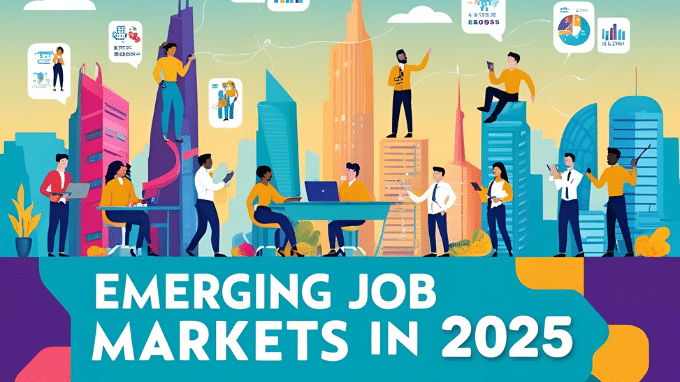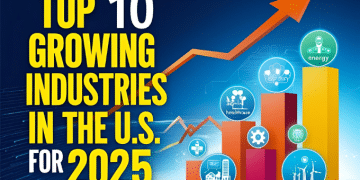Emerging Job Markets in 2025: Career Opportunities For You

The American job market isn’t just changing—it’s transforming, fast. What used to be predictable career paths are now being rerouted by technology, shifting demographics, and new ways of working. According to economic forecasts and employment trends, industries like artificial intelligence, clean energy, mental health, and skilled trades are expected to lead the charge.
And no—it’s not just Silicon Valley and Wall Street anymore. Great jobs are showing up in places that weren’t even on the radar five years ago. From solar fields in the Midwest to behavioral health centers in urban neighborhoods, opportunity is starting to look a lot more diverse.
Whether you’re getting ready for your first job or thinking about switching things up, knowing where the demand is—and what skills employers are actively hiring for—can help you make smarter moves.
What’s Really Fueling This Shift?

There’s no single reason why employment trends is evolving, but a few major forces are steering the wheel. Here’s what you need to know based on recent job market analysis.
1. Tech Is Changing Everything
Tools like AI, automation, and cloud computing aren’t just buzzwords anymore—they’re essential to how businesses operate. That’s created a wave of demand for people who can build, manage, or analyze these systems. Developers, cybersecurity analysts, UX designers—these roles aren’t going anywhere.
On top of that, remote work is no longer a novelty. It’s pushing companies to rethink how they organize teams and what kind of digital infrastructure they need to stay efficient.
2. The Green Economy Is Picking Up Speed
With climate concerns growing and major federal investment in clean energy, companies are under pressure to go green. Jobs in solar energy, environmental consulting, and sustainability reporting are growing fast—and not just in obvious places. Even industries like real estate and finance are hiring professionals who understand environmental impact and compliance.
3. People Are Getting Older, and Healthcare Needs Are Growing
The aging U.S. population is driving a surge in healthcare jobs, especially in home care and rehabilitation. Meanwhile, rising awareness around mental health has opened doors for more counselors, therapists, and social workers. Telehealth is also creating new, hybrid roles that combine tech and patient care.
Read next: Tech Jobs vs. Healthcare Jobs: Salary Breakdown
4. Supply Chains Are Being Rebuilt
Global disruptions over the past few years have made companies rethink their logistics. That’s led to a comeback for domestic manufacturing, warehouse operations, and transportation planning. Jobs that keep goods moving—from factory floor to doorstep—are more important than ever.
5. Workers Want More Than Just a Paycheck
The new workforce values flexibility, purpose, and inclusion. Millennials and Gen Z are reshaping hiring expectations, and companies are listening. That shift is influencing not just what jobs are available, but how they’re structured and who gets hired.
The Industries Poised to Break Out in 2025
Some sectors are quietly gaining momentum—and others are exploding with opportunity. Let’s take a look at the ones you’ll want to watch closely if you’re planning your next move.
Healthcare & Behavioral Health
America’s aging population and the ongoing mental health crisis are creating a huge demand for healthcare professionals. But it’s not just doctors and nurses—roles like telehealth coordinators, mental health counselors, and physician assistants are seeing real growth.
Why it matters: These jobs offer a mix of stability, purpose, and flexibility. With more insurance coverage and less stigma around mental health, the door’s wide open for professionals who want to make a difference—and build a solid career doing it.
Technology & AI
Tech isn’t slowing down, and AI is leading the charge. From cybersecurity analysts to machine learning engineers, companies need people who can keep up with automation, data science, and digital infrastructure.
Why it matters: These roles often come with competitive pay, room to grow, and more flexible work environments. Plus, AI is touching every industry growth now—not just tech—which means your options are wide open.
Green Energy & Sustainability
The clean energy sector is booming, thanks in part to federal funding, favorable economic forecasts, and a growing emphasis on sustainability in the private sector. We’re talking jobs in solar installation, carbon compliance, ESG consulting, and green building design.
Why it matters: These aren’t just niche roles anymore. Sustainability jobs are showing up in places like construction, finance, and even tech. If you’ve got the right training—or are willing to get it—you could land a meaningful role in a fast-growing industry.
Skilled Trades & Manufacturing
Skilled trades are making a serious comeback. With new investments in infrastructure and a growing demand for local production, roles like electricians, welders, HVAC techs, and robotics technicians are in short supply—and high demand.
Why it matters: Many of these jobs don’t require a four-year degree and still offer strong pay and career growth. They also tend to be recession-resistant, which makes them a smart long-term bet.
Read next: How to Find High-Paying Jobs in the USA: 2025 Career Hacks That Work
Logistics & Supply Chain
Behind the scenes of every product delivery is a whole ecosystem of planning, tech, and movement. The pandemic exposed a lot of weak spots in global supply chains, and companies are now rethinking how they operate.
Why it matters: Roles in logistics management, supply chain analysis, and automated warehousing are becoming critical across industries—from healthcare to e-commerce.
Where the Jobs Are: Regional Hotspots to Watch
Opportunity isn’t just concentrated on the coasts anymore. Here’s where job growth is heating up across the U.S.
West Coast
What’s growing: Tech, clean energy, climate innovation
Cities to watch: San Francisco, Seattle, San Diego, Sacramento, Tacoma
What’s changing: High living costs are pushing expansion into more affordable nearby cities.
Southeast
What’s growing: Healthcare, construction, skilled trades
Cities to watch: Miami, Atlanta, Raleigh
What’s changing: A growing retiree population is driving healthcare demand, while construction booms are reshaping urban areas.
Midwest
What’s growing: Advanced manufacturing, robotics, clean tech
Cities to watch: Columbus, Detroit, Chicago
What’s changing: Reshoring and automation are breathing new life into traditional industrial hubs.
Mountain States
What’s growing: Tech startups, infrastructure, hybrid work-friendly companies
Cities to watch: Denver, Phoenix, Salt Lake City
What’s changing: Lower living costs and strong quality of life are attracting talent and investment.
Skills That Will Keep You Competitive
Here are the skill demand that employers can’t get enough of right now:
- Digital & Analytical: SQL, Python, cloud platforms, data visualization tools like Tableau
- Trade & Technical: HVAC repair, blueprint reading, 3D modeling, industrial automation
- Soft Skills: Communication, adaptability, emotional intelligence, critical thinking
- Sustainability Knowledge: ESG standards, carbon reporting, green building certifications
How Employers Are Adapting
To keep up with demand, companies are rethinking how they hire and train talent. Many are offering:
- Tuition assistance and on-the-job upskilling programs
- Remote and hybrid work options to tap into talent nationwide
- “Returnship” programs for professionals re-entering the workforce
- A greater focus on potential and transferable skills, not just degrees or job titles
Read next: Step-By-Step Guide On How To Land A High-Paying Remote Job In 2025
Future-Focused Roles Worth Watching
These roles are gaining traction and may become the norm within the next few years:
- Climate Risk Analyst: Helps companies manage risks related to climate change
- AI Ethics Officer: Ensures that AI systems are built and used responsibly
- Virtual Facility Manager: Manages smart buildings and digital infrastructure
- Behavioral Health Data Analyst: Uses data to shape mental health strategies
- Green Construction Specialist: Works on sustainable building projects with certifications like LEED
The Future Is Full of Possibility
The employment trends in 2025 looks a lot different than it did just a few years ago—and that’s a good thing. There’s more flexibility, more variety, and more ways to build a meaningful career.
If you’re ready to make a move, focus on aligning your skill demand with industry growth, keeping an eye on job market analysis, and using reliable data to i nform your decisions.
Opportunities are out there. The key is being ready to recognize them—and bold enough to act.
Now’s the time to bet on yourself.





